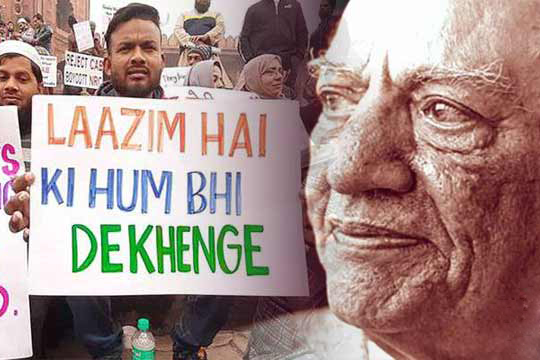A university in Indian state of Uttar Pradesh has set up a panel to investigate if Pakistani Marxist, poet, and author Faiz Ahmed Faiz’s iconic poem “Hum Dekhenge” is “anti-Hindu”, Scroll.in reported.
According to reports, Indian Institute of Technology (IIT) in Kanpur has set up the panel after the poem was recited by students on campus on December 17 during a solidarity march held for their counterparts at Delhi’s Jamia Milia University.
A police crackdown on the Jamia Milia Islamia campus on December 15 triggered nationwide protests as part of the campaign against passing of the Citizenship Amendment Act (CAA), the ongoing National Population Register (NPR) update exercise and the proposed pan-India National Register of Citizenship (NRC).
During one such protest, about 300 students of the institute were not allowed to go out of the campus as large gatherings under Section 144 of the Code of Criminal Procedure were banned, the institute’s deputy director, Manindra Agarwal, was quoted as saying.
A complaint was filed by temporary faculty member Vashimant Sharma and 16 others against the poem. “The written complaint filed by them with the IIT director states that the poem had some wordings that could hurt the sentiments of Hindus,” Agarwal said.
“A committee of six members was established, headed by me, to investigate the matter. Some students have been questioned, while the others will be questioned after they return to the institution after the holidays.”
The probe committee will investigate three areas – whether the students defied prohibitory orders, the social media posts they shared ahead of the solidarity march and if the poem of Faiz Ahmad Faiz is “anti-Hindu”.
‘HUM DEKHEINGE’:
The popular revolutionary poem was written by Faiz in 1979 when he was in Honolulu for a writers’ conference.The poem was included in Faiz’s seventh poetry book titled “Mere Dil Mere Musafir” in 1981 and is known for its rendition by singer Iqbal Bano.
The poem’s beginning deals with conventional themes such as injustice and oppression, then gives way to more overtly religious symbolism. Faiz writes that the idols will be lifted from the Kabah and goes on to describe a revolutionary inversion of power, where the pure-hearted, who were outlawed, or cast out, will be honoured.
The crowns (of those in power) will be thrown up in the air (alluding to a celebration) and their thrones will be cast low. The final stanza of the poem is the most religious in tone, declaring that the only name (essentially on people’s lips) will that be of Allah and a great revolutionary cry of “I am Truth” will go up and people of faith will rule again.
In recent times, the poem has become an anthem for rights activitsts taking to streets across the Indian subcontinent.







